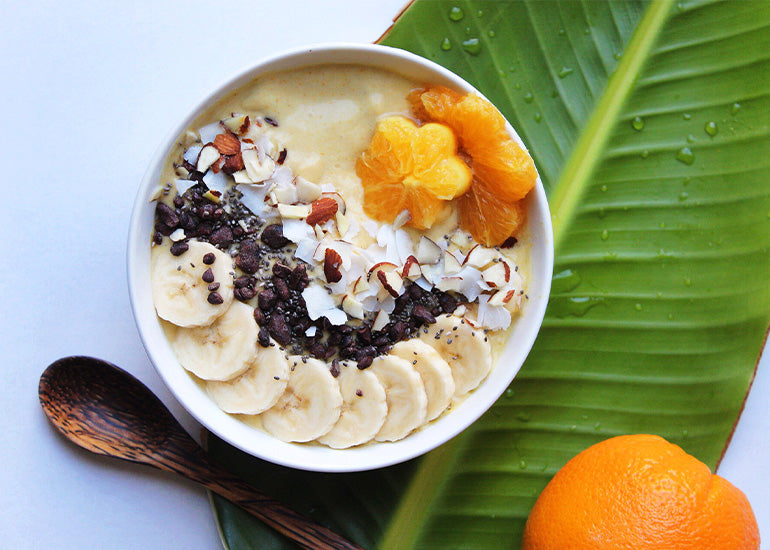With cold and flu season upon us, we address some of our most commonly asked questions around immune health and superfoods. Read on to learn more about the nutritional powerhouses that can elevate your wellbeing and empower your immune system for a resilient and active life!
Which superfoods are best for immune support?
Put simply, any nutrient dense food will support your immune health. That’s because the immune system relies on protein, healthy fats, and an abundance of vitamins, minerals and phytonutrients—not just tart vitamin C chewables! However, while many of these nutrients are easily met in ample quantities by a healthy, diverse diet, the need for certain nutrients—namely, antioxidants—can increase during times of stress and sickness, making some foods extra supportive.
Antioxidants are a powerful class of immune boosting nutrients. They help us ward off or minimize cold and flu symptoms by increasing the production and function of our white blood cells, the tiny backbones of our entire immune system. Antioxidants are also powerful anti-inflammatories, reducing the aches and pains that come with sickness. As an added bonus, some are antiviral and antimicrobial, helping to halt an infection in its tracks.
Antioxidants include nutrients like vitamin C, flavonoids, and polyphenols, and are abundant in many fruits, especially berries. One of the benefits of getting these nutrients from foods instead of supplements is that you get the complex and diverse version as designed by Mother Nature, instead of a simplified version made in a lab.
Camu camu, a berry from the Amazonian rainforest, is the densest natural source of vitamin C on the planet; just one teaspoon of our 100% Camu Powder contains 760% DV for this nutrient! For a hard-hitting immunity boost with extra nutritional diversity, we pair it with acerola cherry and whole freeze-dried orange in our Superfood+ Immunity Blend, two other fruits high in vitamin C and a variety of antioxidants. Another immunity favorite is maqui berry, traditionally used in South America to help the body fend off illness and support immune resilience. With one of the highest antioxidant levels of any fruit, it’s a powerful way to help your system stay strong year-round. These berries, along with acai berries, are packed with polyphenols, which are strong anti-inflammatories. Adding any of these superfoods to juices, smoothies, yogurt, or other simple dishes is a great way to keep your immune system strong and your cells well nourished.
Can I take too much vitamin C?
It’s understandable to worry about overdosing on vitamin C when you see exceptionally high amounts in certain foods, like camu camu. What could our bodies possibly want with over 7 times the recommended daily intake amount? And can it do more harm than good?
With certain vitamins the answer would be yes. Some, like vitamin E, are fat soluble, which means they get stored by the liver and can build up to toxic levels in the body. Others, including vitamin C, are water soluble, meaning that any excess is filtered out by our liver and excreted through our waste systems. Thanks to this mechanism, it’s hard to get too much vitamin C from our diets. This is why taking extra vitamin C from food sources or supplements during times of sickness can help us heal; our bodies use whatever they need and then simply flush out what’s left over.
Still, it’s always possible to get too much of a good thing. If vitamin C is ingested in large amounts at one time, it can cause digestive disturbances, including nausea and diarrhea. This is more likely to happen from a supplement than from whole foods, which come with fiber and minerals, nutrients that help to slow the absorption of the vitamin C into the bloodstream.
What superfoods contain zinc?
Zinc is another nutrient that our immune system leans on. Studies have shown it can reduce the severity of colds when taken at the onset of symptoms. Generally, the amount used in studies has been at levels hard to reach without a supplement, but certain superfoods can help!
Our favorite superfood for zinc is hemp, a mineral rockstar. Just three tablespoons of organic hemp seeds provide about 3mg of the 11mg recommended daily for adults. Hemp Protein Powder, which is slightly concentrated by removing most of the fat content of the seeds, is an even denser source of this nutrient.
Other superfoods that contain smaller amounts of zinc include Cacao Powder, Chia Seeds and Goji Berries.
Do you have a superfood question for Kali? Send it to her at [email protected]!
See what other burning superfood questions customers are asking in our candid "Your Questions Answered" Blog Series here.
)

